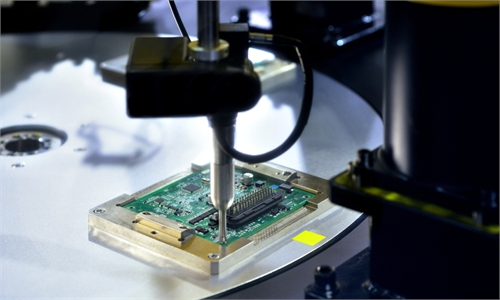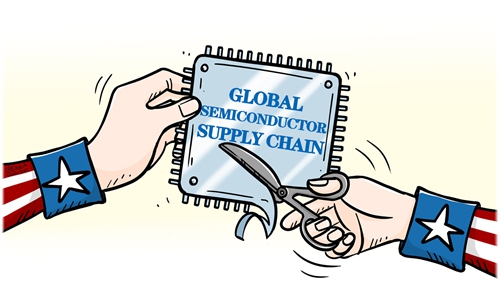
Illustration: Chen Xia/Global Times
US semiconductor giant Intel is reportedly cutting 201 jobs at its offices in Santa Clara, California, which is home to the chipmaker's headquarters, effective Tuesday. This is among hundreds of layoffs the company makes in recent months, and it indicates more job cuts are expected to come. Intel spokesperson Addy Burr said Thursday that the company continues to cut costs "while navigating a challenging macroeconomic environment," but the company's current problems clearly go beyond a tough macroeconomic environment.
Intel's stock price on Friday saw a "historic collapse" erasing $8 billion from its market value after it reported disaster earnings for the fourth quarter and 2022 and dismal earnings projections. In the fourth quarter of 2022, Intel's net loss was $661 million, a year-on-year decrease of 114.3 percent. For the whole 2022, Intel's net profit stood at $8 billion, a 60 percent drop from $19.87 billion in 2021. The company also predicted a surprise loss for the first quarter of 2023.
The current difficult situation of Intel, the long-term leading US semiconductor giant, fully highlights that the "decoupling" and suppression practices of the US in recent years to hinder the development of China's semiconductor field are counterproductive. The US' lose-lose strategy will not only fail to stifle the progress of China's semiconductor industry, but will cause serious harm to American chipmakers that have been making a lot of money in the Chinese market.
In order to completely stifle the development of China's semiconductor industry and maintain the hegemony of the US in this important strategic field, the US government has spared no effort in recent years to promote "decoupling" and artificially disrupt the normal cooperation and trade of the global chip industry chain. Its specific approach is mainly reflected in three aspects:
First, the US government has continuously imposed export restrictions and bans on Chinese companies, trying to prevent leading companies in the global semiconductor field from exporting advanced chips and advanced manufacturing equipment to China, so as to hinder China from obtaining technological progress. In October 2022, the Biden administration imposed the most sweeping export controls on China to date, fully escalating its chip war against China, which experts said is profoundly changing global supply and demand and will continue to create an imbalance in chip supply in 2023, weighing on chipmakers across the world.
Second, the US government is trying to revitalize semiconductor research and development and chip manufacturing within its border by increasing subsidies. US President Joe Biden in August 2022 signed into law the CHIPS and Science Act that authorizes about $52 billion in government subsidies for US semiconductor production and research. Yet, US media outlet The New York Times wrote that the US' soaring spending pouring into chips is "not a silver bullet" to revitalize the country's chip production that only accounts for 12 percent of global production capacity.
Third, the US government has comprehensively intensified the coercion of semiconductor companies in its allies to forcibly "decouple" from China's semiconductor industry in order to achieve the goal of blocking China. The US' approach is clearly to maintain its hegemony and self-interest at the expense of its allies. The actions of the US have caused widespread concerns among companies in many countries.
In the Biden administration's plan to promote the return of the chip industry and revitalizing the US chip industry chain, Intel is expected to become a "star" company. However, the US' crackdown on China's chip industry has led to a decline in sales in US chipmakers, which is one of the reasons why Intel plans to lay off workers on a large scale. It needs to be seen that although Intel's revenue in the Chinese mainland declined in 2022, China is still the company's largest market, according to media reports. Obviously, the recovery of the Chinese market is crucial to Intel.
The US "decoupling" policy will not affect China's determination to further deepen cooperation with other countries' semiconductor industries. China will continue to provide a huge market for the market-oriented application of advanced technologies, which could serve as a continuous impetus for growth of companies that are willing to cooperate with China. If the US government continues to ignore the laws of the market and the choices of enterprises, arbitrarily cutting off the industrial and supply chains, US companies like Intel can only watch the gap between themselves and their competitors widen.
The author is a reporter with the Global Times. bizopinion@globaltimes.com.cn



